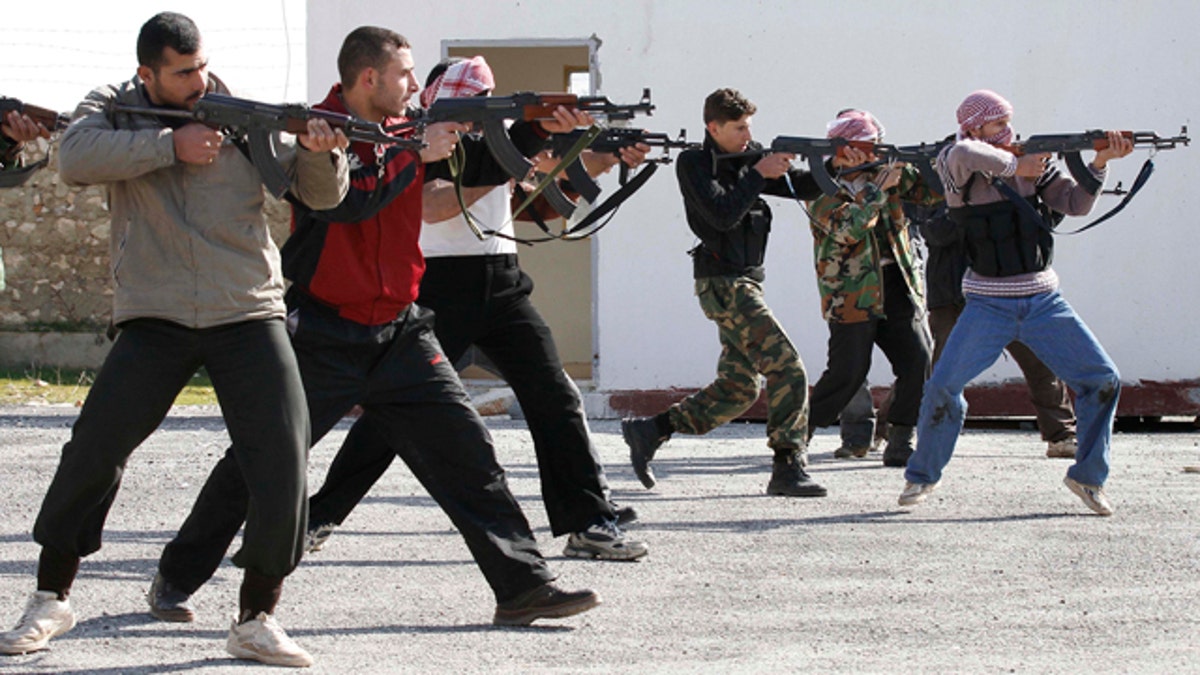
Feb. 14, 2012: FILE- In this file photo, Syrian rebels aim during a weapons training exercise outside Idlib, Syria. (AP)
As the death toll in Syria saw 80 new names added on Wednesday, diplomats at the United Nations Security Council in New York hailed the unanimous passage of a so-called "Presidential Statement," which among other things called for an immediate end to the violence in the country.
The statement will likely further dampen Syrian opposition hopes of getting outside military help, and could limit the scope of the Second Friends of Syria conference -- slated to begin on April 1st in Turkey.
Aram Nerguizian, a Visiting Fellow at the Center for Strategic & International Studies, a D.C. think tank, told Fox News that "real-world expectations of the first 'Friends of Syria' meeting were low, and there is little reason to be much more optimistic about the second meeting."
Yet rumors of a change in U.S. policy on the arming of the Syrian opposition have emerged in recent days, with one report quoting senior administration officials as saying that, while the U.S. won't directly arm or support the arming of the Free Syrian Army, it won't stop other countries from doing so.
Asked for comment, an administration official dismissed the reports, saying the administration remained focused on a diplomatic solution.
Tony Badran, a research fellow at the D.C.-based think tank Foundation for Defense of Democracies (FDD), told Fox News that the U.S. was "adamantly against any hint of incorporating a military component to the policy."
"Not only has the administration taken this option off the table for itself, but it has also pressured regional allies such as Saudi Arabia and Turkey against taking such steps on their own," Badran added.
Yet earlier this week, the French news agency AFP quoted a source believed to be a top Arab diplomat as saying Saudi Arabia was sending military equipment to help arm Syrian rebel fighters of the Free Syrian Army (FSA). Contacted by Fox News for a response, the Saudis declined to comment.
Badran said the report could possibly be interpreted as a warning that Saudi Arabia would "begin arming the opposition after giving the diplomatic track one last chance -- as per the Obama administration's request."
The arming could begin after the second Friends of Syria meeting, he said.
But Badran also said the report could be interpreted as a deliberate leak "designed to deter the Saudis and to sabotage their drive to arm the opposition."
CSIS's Nerguizian told Fox News the Saudis and other Gulf States have indicated at least a "rhetorical willingness" to provide financial aid and arms to the Syrian opposition. But he added: "It is still unclear what the scale and scope of Gulf support for the armed opposition and the insurgency are."
Nerguizian cautioned that "providing material support to opposition forces will likely justify a harsher crackdown."
According to Nerguizian, there are "no good options" for U.S. policy.
"Arming the opposition is likely to do little to tipping the internal balance of power and is more likely to fuel a protracted crisis that will become more sectarian, more radical and more divisive over time," he said.
Nadr -- he refuses to give his full name out of fear for his security -- warned from the refugee camp on the Turkey-Syria border that the longer the world waits, the higher the body count will become.
"We don't want (NATO) to help us like in Libya," Nadr told Fox News. "We need weapons to fight the regime and the Free Syrian Army can do that for us."
He dismissed claims that Al Qaeda was involved in the fighting as baseless.
